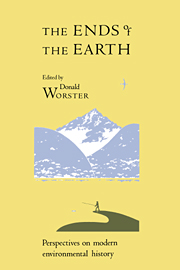Summary
The purpose of this book of essays is to introduce readers to the new and rapidly growing field of environmental history. Every so often comes the question with blunt, honest simplicity, “What is this field all about?” It is easy enough to respond that the field deals with all the interactions people have had with nature in past times. Or to illustrate its themes with an example or two showing how ecological transformations have shaped the course of history. Or to put the case that conventional history has been too anthropocentric in outlook, sundering the seamless unity of humankind and the rest of nature; that in contrast this new history insists humans are and always have been creatures of nature dwelling in a natural world. But, as is usual with such ready formulaic answers, they do not begin to capture the variety and complexity of the field, nor reflect the disagreements among its practitioners, nor exemplify the richness of ideas and perspectives animating the work. So, it is hoped, this book may provide a more thoroughly enlightening answer to the question “What is it?”
A few of the selections included here are reprinted from other sources, and their authors may never have thought of themselves as environmental historians. But in their own time and way they dealt with the substance of the field even before it had a name – with climate, food, resources, population, and the like – and thus deserve recognition as forerunners or predecessors.
- Type
- Chapter
- Information
- The Ends of the EarthPerspectives on Modern Environmental History, pp. vii - viiiPublisher: Cambridge University PressPrint publication year: 1989

